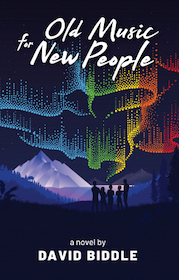Draft Work-in-Progress
Another excerpt from the novel-in-progress, Beautiful Morning Blues
Chapter 21
If I was very lucky, I would find Tina’s shampoo and cream rinse on the caddy. I’d be naked, water beating down on my paunch, Dial soap in my hand, the room scenting up with steam and Dial’s peculiar spicy 20th century perfume. Before me in the shower would be evidence of my wife in the form of nutmeg cream rinse, Noxema, pink disposable razors, lavender body wash, and salon shampoo alchemized to enhance the shine of dark Italian hair – my wife, who could no longer show that she loved me, who might by then have had an affair. She never called me back when I left her a message at work; she went to sleep an hour before me. There would no longer be even one child in our home. We’d be alone in the house, separately. And I would still be wondering why I had done what I had done with myself and my rather meager-sized cock.
###
Another another excerpt from the draft novel, Beautiful Morning Blues

I had been up half the night inspecting a co-worker’s computer for pornographic content in the privacy of our den with its windows overlooking our backyard. This was an assignment that I was given by our I.T. director. Some of the executives were worried about the possibility of illegal videos and photos on this co-worker’s hard drive. The company had no policy for such a situation. With my computer skills, and having practically nothing to do with the I.T. department, I was the proverbial monkey holding the cork.
“This is important,” I was told. “We’re counting on you.”
It was August 9th. Dressed for work, yawning from lack of sleep, I stood on the front porch and looked east down the hill from our house toward the Philadelphia Cricket Club. The heavy, wing-beat flutter of a ruby-throated hummingbird briefly filled the air as it darted by on its way to a Rose of Sharon bush running along the fence between our yard and the Willoughby’s next door. Two small, adolescent rabbits foraged down the driveway near my Audi. Filtered through orange morning haze, the Cricket Club’s thirty-eight grass tennis courts pulsed in the distance with a wobbly emerald sheen so bright I could smell it.
<snip – snip>
Let me know you read this. Tell me what you think. If you’re interested, let me know if you want to beta read this puppy when it’s ready to go. That’s what the comments section is for.
An excerpt from the novel-in-progress Ex:Urbia
We all drove SUVs up until about 2001. You would think we were a rather stuffy and Republican lot if you toured around our neighborhood, but most of us were more middle of the road. When it became apparent once and for all that Middle Eastern oil had managed to seep into the heart of world crisis in the early days of the Iraq takeover, we all shed our big gas guzzlers for the old hybrid/minivan combo. We talked about the need to do this at parties and when we met on Derry Lane out for walks on the weekend. Our household was a little different. Danny bought himself a black Prius in 2004. I converted to a dark-blue Audi A6 Quattro — not exactly all the way in with a hybrid, but it was a start. We also had a gray Honda Odyssey for family outings, weekend shopping, carpooling, and road trips. Our gas consumption bills went from about $400 a month to $185. Most of that was still me. I knew Audis weren’t that fuel efficient, but I liked the way I felt in my A6 and it still got 22 mpg compared to the 12 I managed with my Suburban.
You prepare for your daily drives without thinking — in to work, back home; in to work, back home; in, back, work, home. It’s like you’re lost with a purpose, like you’re paid for driving and being lost in the middle of traffic with everyone else who also happen to be lost and getting paid. Work didn’t matter, at least to me. It was all about money. It’s easy to feel like work is where you go spend time in between drives. That’s the problem with luxury cars. I didn’t talk to anyone about this feeling, I just lived it.
Interlude in the Bedroom: An Ex:Urbia Excerpt
There has to be a moment near the beginning when you start to take pieces of your love back. You begin as two people, alone in a house, together, not so much against the world but certainly sitting quietly as a team in a corner just talking amongst yourselves, oblivious, happy even with that thing called love. It lasts as long as it lasts. Maybe that dislodging and taking back of love happens slowly over time. Or maybe it just happens in a day or an hour or in a flash — a single moment of disappointment with the partner, one misunderstanding too many, or just exhaustion.
Even Danny Davenport had his bad qualities. Certainly Julia Davenport did. He wasn’t political. He had a hard time with people who felt sorry for themselves. He wrote them off. He also didn’t want to admit — ever — to his own challenges and fears, just like every other adult in America today.
“I don’t want to go to the Piehlblads tonight.”
“Why not?”
“June opens up too much. I really don’t want to hear her problems. You know that.”
“But she’s funny.”
“Funny I watch on TV.”
“Just because she broke down the last time we were over there.”
“Broke down? She was drunk and took me aside to complain about Terry.”
“And you were a good friend. To both of them. You tried to set her straight.”
“You weren’t there. She told me way too much.”
“Like what?”
“Like she never should have married him. He has trouble in bed. He’s a lousy father. He lies sometimes about how important he is…”
“She was drunk.”
Danny sighed. “I don’t want to go see her. I don’t want to be a party to that kind of an evening again for at least another two years.”
Dialog Before a Snowball Fight
For the novel-in-progress, Dawn of the Summertons.
“You know people read less and less every year. It worries me.”
Reggie and Twyla were sitting at the kitchen table drinking tea. Through the windows looking out to the street, the three children could be seen at different strategic spots shoveling snow. Lester had the walkway and steps leading down to the street. Kristin and Bess were at separate ends of the sidewalk. The girls shoveled the snow onto the yard instead of the street the way their parents had taught them.
“Some people think that’s going to turn around with these new e-books.”
 “That makes no sense.”
“That makes no sense.”
“Why?”
“Have you ever tried to read an e-book?”
“Sort of. I’ve used that Google reading app to review a biography of Leonardo.”
“And?”
“And what?”
“Did you finish the book?”
“I was just experimenting.”
“Right.”
She took a sip of tea and waited.
“What I’m really getting at is that reading has gone from this thing that people do regularly to a sort of random activity. Someone says, hey, you ought to read this. Or you’re in a dentist office and there’s a short little review clip in People for a new “How – To” book.”
“It’s always been like that, hasn’t it?”
“Not like it is now. No. Now it’s gotten down to randomness. It used to be that most people read regularly. You paid attention to books. Sure, you took someone’s advice if they were someone you trusted. Or you might read about some new book in the review section of the paper. But now papers don’t review books much. And when people give you recommendations, you have to remember them. But there’s so much information flying at you remembering a book recommendation is not easy.”
“So you subscribe to the view that we’re swamped with data? Inundata-ed?” She couldn’t help herself.
He gave her his look, mouth open, eyes wide — his, I’d laugh at that if I wasn’t in the full flower of making a point I think is extremely important. She smiled at the expression, then beckoned to him with both hands waving back at herself, come on, let it out, bring it, I’m listening.
Hat in Hand
Raw, first draft work from Dawn of the Summertons, a novel-in-progress (posted November 19, 2012)
Reggie sat in the small alcove waiting to meet with Stuart Worthington. The room was only about ten feet long and six feet wide. Reggie felt like he was standing in a well-lit, comfortable closet. The walls were a dull gold hue except for the front wall which, besides the door, was almost entirely made up of an opaque, smoked glass window, letting in the December light ever so carefully. A large digital television hung on the wall above two chairs lining the wall opposite the door.
Upon entering the room he’d gone to the small window in the wall directly opposite the door. He could see the face of a woman through the glass, peering at a computer screen. The window was only about a ten-inch square. He saw at the top that there was what looked like a small speaker and a button like a doorbell.
He stood waiting for several minutes watching the woman. All he could see was the top of her face, her hair, and the back of her computer screen. Finally, he tapped on the glass. The woman’s eyes seemed to register the sound, but did not look up. He waited. She had grey eyes and fine eyebrows. He liked her high forehead and curly hair. He thought she might be in her early sixties, but it was hard to tell. Her skin was smooth. She wore glasses.
He pushed the button near the speaker. The woman seemed to jump a little. She looked up at the window, squinted, then pushed a button on the top of her desk. “Yes?” He said, “Reggie Summerton here to see Mr. Worthington.” She blinked several times but kept her gaze down, staring at her desk. Eventually she pushed her button again. “Is someone out there?” He smiled and waved. Her expression didn’t change. Her eyes remained downturned. She pushed the button again. “Excuse me,” she said, “if there is someone out there, please use the button to speak.” She sat back in her chair and waited. Reggie pushed the button.
“Hello. I’m sorry. Reggie Summerton here for Mr. Worthington.”
“Is he expecting you?”
“Um…I believe so. I set up a meeting with him for today last Thursday and confirmed it last night in an email.”
The woman seemed to do something with her hands, then she looked at the computer screen. “Ah. Yes. Mr. Summerton. Excuse me.” She turned her face fully towards the opening in the wall. All of a sudden she appeared to be very happy. It seemed to Reggie that he’d seen her around on Germantown Avenue shopping over the years. “Please have a seat. Mr. Worthington will be with you shortly.”
As he stepped back toward his chair, it occurred to him that an apology was in order first thing to Stuart Worthington. He’d made a rather memorable buy – an acrylic landscape of a bridge in North Philadelphia called “The Bridge of Time,” with industrial architecture fading into the distance and a pile of discarded rubber tires in the right corner at the base of the bridge. Worthington had proudly declared that he had a steal and that it was a small investment in a great up and coming artist. This was where the apology was necessary. Twyla had never become the next big thing. She’d focused on being a mom for the next ten years. Not that she’d given up her career, but with three kids to raise, she’d only been able to produce a few finished works a year.
Excerpt from Dawn of the Summertons (WIP)
Wading through the shimmer, she quickly grasped the edges of the next drapes and spread them wide with one stroke. Then another set, and another. She seemed so far away. Reggie blinked each time as the room seemed to be lit now by a white fire.
Twyla continued down the line of windows. He counted sixteen sets of curtains. She laughed and he noticed for the first time that he could see her breath.
“Reggie?”
He shook his head and felt whatever it was roll back and forth.
“Reggie? Are you okay?” She was a long, long way away standing on the table the workers used. Paper sacks and soda cups hid her feet.
“Reggie?”
Was he supposed to respond? What was happening to him?
“Hello! Reg? Earth to Reginald Summerton!”
He swallowed again, shook his head back and forth quickly checking to see if he could still detect the loose body, then said, quite loudly, “Twenty-four!”
“What?”
“Twenty-four! Windows! Twenty-four windows.”
“And a fireplace or two,” she said, pointing at the back wall. “Four fireplaces in one room? That’s crazy. One on either end, and then the two back there. Where’s the wood pile?”
“I think there’s something in the back,” he called to her. “Can’t remember. But we can ask the workers whether they know where to get more wood. What’s it called, again? A skid? A … um, what?. A cord. That’s it.”
“I always think about pianos when I hear that term,” she said. “Cut wood kind of looks like piano keys. I’d think about a piano made with raw wood keys or even popsicle sticks. All of that came because I thought when they said cord that they really meant a musical chord. You know?” She waited for his laugh.
“Do you suppose,” he said, finally. “that we heat this area just with the fireplace?”
“There’s radiators,” she said, again pointing to the back wall and then over in between windows.
She stepped down from the table. “This is what they call a great room, right? Emphasis on great.” She extended her arms out in front of her and staggered towards her husband. “Great!” she said, dodging furniture and walking like a drunken Frankenstein.
He needed to concentrate in order to respond. “Sure seems like this would be something great,” he said. “But it’s gonna break the bank to Christmas this up.”
Twyla stopped in the center of the room and put both of her fists on her hips. He knew the excitement on her face too well. Life with an artist was really about life with a project manager. She had stopped directly under the center chandelier. Her arms floating off her hips, spread wide, she rotated slowly in a circle.
“We’re going to be okay, Reggie. We’re okay. A little trip to Salvation Army, maybe some other thrift shops down Chelten Avenue and deeper into Germantown. We can handle this. The only thing we’re really going to need to shell money out for is trees.”
CHOICES
By David Biddle
I covered my left eye with my fingers and turned around. The eclipsing sun pierced my right pupil for just a split second as the moon slid into place and Bailey’s Beads began to spin. These beads of light are little solar flames of prismatic ruby light bouncing off the valleys of a black moon. That was in the mountains in 1979, more than thirty years ago. I’m sure this is the cause of my vision troubles today.
Doctor Davis has been after me for several years now to go visit an ophthalmologist. I used to love the way typeface made me feel. In a well-made book the lines of each word would glaze into my eyes. Character edges, kerned by a skilled chisel, seemed to rise off the page, piercing the appropriate membranes of memory, lodging in a mix of cerebral fluid and electrochemical significance. When a word appears sharp and true to the eyes, meaning is sharp and true. The mind understands and beats just like the heart. Over the last few years, though, the words I look at have started mashing up. Information is more smudged into me, pressure-glued to random spots around my optical nerve. Some mornings whole sentences swim up and down on the page. My mind rarely seems to beat like my heart anymore.
Doctor Davis noticed my eye problem back in 1995, a year after I got a 19-inch VGA monitor at work. I’m a desktop publishing specialist and copywriter with a well-known health insurance company. Twelve years after that he suggested a visit to a specialist, he asked me why I had not yet made an appointment. I told him that I had so many things happening to me I was lucky to get in for a basic physical every two years. Using more patience than you would expect, he directed me specifically to one Dr. Louise Singleton who is located in his same office park. I saw right through that one, of course. Doctors are like all other business people. I imagined the two of them getting together twice a year over lunch at The Palm or The Striped Bass, surreptitiously exchanging #10 envelopes full of cash. His envelope for her is a goldenrod job containing maybe $400 right out of the cash box where he keeps all his co-pay money. She gives him a lightly scented, off-white envelope made of 20-percent post-consumer recycled paper. Pink granite. Her payment is higher, nearing $1,800. He’s routed almost twenty cases to her in the past six months. Why else would he have been so patient with me after two years of ignoring his advice?
They talk shop and she writes off the luncheon. She has the minty pea salad with lemon-garlic mayonnaise made with lots of turkey bacon and asparagus. She drinks two glasses of Chablis and about halfway through the second glass feels flushed and more excited than she thinks is safe, wants to go somewhere to be alone with her thoughts.
He has the swordfish-pecan pasta salad, made with fresh dill and tarragon all held together by a special iced Bearnaise sauce that explodes with flavor due to the minced shallots and Pommery champagne the chef has added. After his third mouthful of creamy swordfish, linguini, and toasted pecans, Doctor Davis thinks back to the days when he was a child baking cakes with his father who owned a catering company, how batter always tasted better than anything else in the world – even the finished cakes – and how his father once let him eat an entire cake’s worth of raw lemon-vanilla batter. Even though it made him sick, the act, every mouthful, was sublime. He wonders if the Bernaise all by itself would have the same effect. Could you order a bowl of Bernaise sauce? Maybe a few pieces of dark pumpernickel toast to dip? How much cream sauce would it take before you got sick like with cake batter?
Doctor Davis would have the same Chablis as Doctor Singleton, but he would be careful to drink slowly and to order a Black Turkish Espresso Walnut Mousse along with a demitasse of orange French Roast topped by a dollop of whipped cream. I once told him that I felt it likely there is no successful person in America who drinks alcohol before six p.m. He told me that he agreed with the sentiment but that it was possible to overcome the effects of alcohol in the middle of the day by consuming a very large portion of caffeine and sugar after imbibing at lunch. I could tell he was a lunchtime drinker and feeling defensive when he told me this. That’s how I know about the French Roast and the Espresso mousse. It’s also how I know that someday he is going to die of a heart attack before he returns to his office after lunch. I bet one quarter of all the heart attacks in America come after drinking too much coffee. Dying with coffee breath would be embarrassing as hell.
I’m just assuming my doctor has a business relationship with Louise Singleton. I have no evidence that they are exchanging cash every summer and winter. I also have no idea whether they’re having an affair, and although at that time I’d never met Doctor Singleton, I was sure by the way my doctor talked about her that she was very attractive, maybe sexy, certainly pleasing to speak with: like a flight attendant out over the Atlantic in the middle of the night. It made me, just for a few minutes there in his office, want to go for an appointment just to find out what she looked like and to look into her eyes. I imagined that they were bright moon gray and came, along with her whole beautiful face, very close to mine while diagnosing my problems.
I snapped out of it pretty quickly, though, and figured I could wait another five years at least. They sell amazing reading lamps these days. Laser beams for illumination, shimmering diamond light that will blind you like looking into the sun. I’m going to admit this here: I am middle aged and along with all the other shit that is going wrong with me, my imagination is becoming obsessed with the idea of having sex with women almost on a random basis. My eyes are failing but I spend a phenomenal amount of energy trying to ignore my libido.
♥
I don’t know why Angeline has stayed with me all these years…
<Snip>



[…] Work-in-Progress […]
[…] Work-in-Progress […]